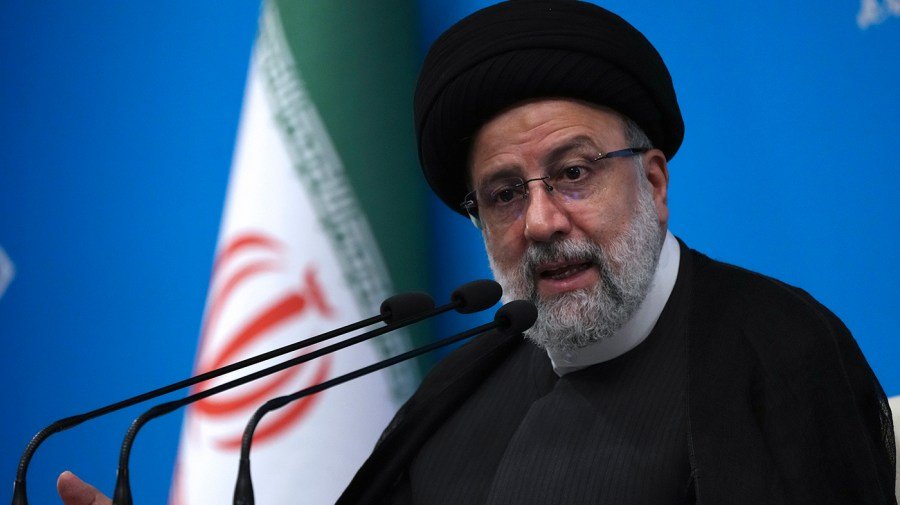World News
Biden’s new deal with Iran draws fierce blowback on September 13, 2023 at 10:00 am

A Biden administration agreement with Iran to unfreeze $6 billion of funds to Tehran in exchange for the release of five American prisoners has roiled lawmakers on both sides of the aisle.
Republicans in Congress and even a few Democrats fear that such a deal encourages hostile nations to take more Americans traveling abroad as hostages in the future.
While the administration has touted the agreement — which comes after more than a year of indirect negotiations between Washington and Tehran — as a diplomatic breakthrough, critics say Washington has catered to a foreign adversary it shouldn’t have negotiated with in the first place.
“If we’re paying a billion dollars per kidnapped individual, then you’re going to see more kidnappings. That’s why you don’t negotiate with terrorists, that’s why you don’t negotiate with kidnappers. The idea of basically paying to release, in this effect, a hostage is a terrible idea,” Sen. Mitt Romney (R-Utah) said.
“Remember back in the Reagan years, we had — was it — guns for hostages, that was the story, remember that? This is a billion dollars for a hostage,” he added.
Sen. Tom Cotton (R-Ark.) called the move “shameful” as it pays “ransom to the world’s worst state sponsor of terrorism.”
Even Senate Foreign Relations Committee Chairman Bob Menendez (D-N.J.) spoke up over “concerns” that President Biden was creating incentives for more Americans to be taken hostage.
“This is an example of why we have to go ahead and make it very clear to Americans that they cannot travel to certain places in the world where they are likely to ultimately become a hostage. Until we do that we will constantly be in a set of circumstances” where the United States faces negotiations to free detained Americans, Menendez told reporters Monday.
Though U.S. officials have said the funds will only be used for humanitarian purposes, GOP lawmakers also fretted that the deal could free up dollars for Iran elsewhere that could be used to purchase weapons or back dangerous proxies.
“President Biden can’t seem to cut his habit of sending money to terrorists,” Sen. Tim Scott (R-S.C.) posted on X, the platform formerly known as Twitter.
“It’s $6 billion to Iran on 22nd anniversary of 9/11,” Scott added, asserting Biden “is putting a price on American lives.”
Rep. Mike Waltz (R-Fla.), meanwhile, tweeted that there was “NO downside for dictatorships, like Iran or Russia, to take Americans hostage. With Biden, these regimes always get a good deal in the end and that’s why they’ll keep doing it.”
And Rep. Ben Cline (R-Va.) wrote on X that cutting such a deal was “naïve and dangerous.”
Secretary of State Antony Blinken signed a waiver last week enabling the transfer of $6 billion in oil revenues blocked in South Korean banks due to U.S. sanctions. The previously frozen funds are due to be released to restricted accounts in Qatar banks, a State Department spokesperson confirmed to The Hill.
The U.S. also gave the go ahead for the release of five Iranian nationals currently detained in the United States, with both steps meant to grease the wheels for the release of five U.S. citizens held in Iran.
Washington seeks to free three known individuals all sentenced to 10 years in prison in Iran: Siamak Namazi, 51, detained in Iran in 2015 while visiting family and accused of spying; Emad Sharghi, 59, a businessman first arrested in 2018; and Morad Tahbaz, 67, a British-American environmentalist of Iranian descent arrested in 2018 and charged with spying and colluding against Iran’s national security.
The fourth and fifth detainees have not been identified, though all five are under house arrest in Tehran.
State Department spokesman Matt Miller insisted Tuesday that the deal was a “tough choice” that was necessary as “Iran is not going to release these American citizens out of the goodness of their heart.”
“That is not real life, not how this works, that was never going to happen,” he said. “We have to make tough choices and engage in tough negotiations to bring these American citizens home.”
The State Department also called the transfer “a critical step” in securing the release of the Iranian-Americans, stressing that Washington has not lifted any of its sanctions on Tehran or offered the country any sanctions relief.
The U.S. continues “to counter the Iranian regime’s human rights abuses, destabilizing actions abroad, its support for terrorism, and its support for Russia’s war against Ukraine,” the spokesperson said.
Despite the disapproval from GOP lawmakers, the agreement between Washington and Tehran marks a major development for the adversaries. The two have long butted heads over issues including aggressive Iranian military moves in the Gulf of Oman, Tehran’s ties with Moscow — including supplying Russia with weapons for the Kremlin’s ongoing war in Ukraine — and negotiations over the all-but-dead Iran nuclear deal.
The criticisms are also not unexpected; Republicans in the past several weeks have voiced their displeasure over any agreement with Iran after the initial parameters of the deal were reported.
House Foreign Affairs Committee Chairman Michael McCaul (R-Texas) claimed last month the dollars could be used to “prop up” Iran’s aggressive foreign policy agenda.
“I want to get these Americans home more than anybody,” McCaul said. “But we have to go in [with] eyes wide open. [The] $6 billion that now is going to go into Iran [will] prop up their proxy war, terror operations, and their nuclear bomb aspirations,” he told Fox News Sunday.
Still, several GOP presidential hopefuls took the finalization of the deal as a fresh opportunity to level blows at Biden, including former President Trump, who called the commander in chief an “incompetent fool” and suggested without evidence that he was getting a “kickback” from the funds being returned to Iran.
Former Vice President Mike Pence similarly claimed the agreement “endangers Americans abroad,” while former United Nations Ambassador Nikki Haley said the only thing that makes the new worse is “announcing it on 9/11.”
Florida Gov. Ron DeSantis (R), meanwhile, claimed on X that the deal “bankrolls nuclear ambitions, hostage takers, and extremists who hate America.”
But National Iranian American Council President Jamal Abdi called the politicization of the prisoner swap “disturbing and disheartening.”
“The prisoner swap can be a win for the American and the Iranian people provided that it is defended from the hawks in Washington and Tehran who don’t want to see it happen,” Abdi said. “If the process plays out, five Iranian Americans will be reunited with their families and Iranian money will be used to purchase food and medicine as intended. We can both condemn the reprehensible hostage taking of Iran’s government while welcoming the release of those wrongfully detained.”
Further complicating matters for Biden, however, is the new assertion by Iranian President Ebrahim Raisi that his government will choose how it’ll use the $6 billion once the funds are unfrozen.
The money “belongs to the Iranian people, the Iranian government, so the Islamic Republic of Iran will decide what to do with this money,” Raisi said in an interview Tuesday on NBC News.
The United States quickly pushed back, insisting that South Korea will release the funds to Qatar’s central bank, which will oversee that the dollars can only be used for humanitarian aid such as food and medicine, as U.S. sanctions stipulate.
“The money can only be used for humanitarian purposes,” Miller said Tuesday. “We will remain vigilant in watching the spending of those funds and have the ability to freeze them again if we need to.”
And National Security Council spokesperson John Kirby told MSNBC that Raisi was likely “playing to his domestic audience” with his comments, noting that “the parameters of this arrangement are very clear.”
A Biden administration agreement with Iran to unfreeze $6 billion of funds to Tehran in exchange for the release of five American prisoners has roiled lawmakers on both sides of the aisle. Republicans in Congress and even a few Democrats fear that such a deal encourages hostile nations to take more Americans traveling abroad as hostages in the…
Business
Pros and Cons of the Big Beautiful Bill

The “Big Beautiful Bill” (officially the One Big Beautiful Bill Act) is a sweeping tax and spending package passed in July 2025. It makes permanent many Trump-era tax cuts, introduces new tax breaks for working Americans, and enacts deep cuts to federal safety-net programs. The bill also increases spending on border security and defense, while rolling back clean energy incentives and tightening requirements for social programs.

Pros
1. Tax Relief for Middle and Working-Class Families
- Makes the 2017 Trump tax cuts permanent, preventing a scheduled tax hike for many Americans.
- Introduces new tax breaks: no federal income tax on tips and overtime pay (for incomes under $150,000, with limits).
- Doubles the Child Tax Credit to $2,500 per child through 2028.
- Temporarily raises the SALT (state and local tax) deduction cap to $40,000.
- Creates “Trump Accounts”: tax-exempt savings accounts for newborns.
2. Support for Small Businesses and Economic Growth
- Makes the small business deduction permanent, supporting Main Street businesses.
- Expands expensing for investment in short-lived assets and domestic R&D, which is considered pro-growth.
3. Increased Spending on Security and Infrastructure
- Allocates $175 billion for border security and $160 billion for defense, the highest peacetime military budget in U.S. history.
- Provides $12.5 billion for air traffic control modernization.
4. Simplification and Fairness in the Tax Code
- Expands the Earned Income Tax Credit (EITC) and raises marginal rates on individuals earning over $400,000.
- Closes various deductions and loopholes, especially those benefiting private equity and multinational corporations.

Cons
1. Deep Cuts to Social Safety Net Programs
- Cuts Medicaid by approximately $930 billion and imposes new work requirements, which could leave millions without health insurance.
- Tightens eligibility and work requirements for SNAP (food assistance), potentially removing benefits from many low-income families.
- Rolls back student loan forgiveness and repeals Biden-era subsidies.
2. Increases the Federal Deficit
- The bill is projected to add $3.3–4 trillion to the federal deficit over 10 years.
- Critics argue that the combination of tax cuts and increased spending is fiscally irresponsible.
3. Benefits Skewed Toward the Wealthy
- The largest income gains go to affluent Americans, with top earners seeing significant after-tax increases.
- Critics describe the bill as the largest upward transfer of wealth in recent U.S. history.
4. Rollback of Clean Energy and Climate Incentives
- Eliminates tax credits for electric vehicles and solar energy by the end of 2025.
- Imposes stricter requirements for renewable energy developers, which could lead to job losses and higher electricity costs.

5. Potential Harm to Healthcare and Rural Hospitals
- Reduces funding for hospitals serving Medicaid recipients, increasing uncompensated care costs and threatening rural healthcare access.
- Tightens verification for federal premium subsidies under the Affordable Care Act, risking coverage for some middle-income Americans.
6. Public and Political Backlash
- The bill is unpopular in public polls and is seen as a political risk for its supporters.
- Critics warn it will widen the gap between rich and poor and reverse progress on alternative energy and healthcare.
Summary Table
| Pros | Cons |
|---|---|
| Permanent middle-class tax cuts | Deep Medicaid and SNAP cuts |
| No tax on tips/overtime for most workers | Millions may lose health insurance |
| Doubled Child Tax Credit | Adds $3.3–4T to deficit |
| Small business support | Benefits skewed to wealthy |
| Increased border/defense spending | Clean energy incentives eliminated |
| Simplifies some tax provisions | Threatens rural hospitals |
| Public backlash, political risk |
In summary:
The Big Beautiful Bill delivers significant tax relief and new benefits for many working and middle-class Americans, but it does so at the cost of deep cuts to social programs, a higher federal deficit, and reduced support for clean energy and healthcare. The bill is highly polarizing, with supporters touting its pro-growth and pro-family provisions, while critics warn of increased inequality and harm to vulnerable populations.
Business
Trump Threatens to ‘Take a Look’ at Deporting Elon Musk Amid Explosive Feud

The escalating conflict between President Donald Trump and Elon Musk reached a new peak this week, as Trump publicly suggested he would consider deporting the billionaire entrepreneur in response to Musk’s fierce criticism of the president’s signature tax and spending bill.

“I don’t know, we’ll have to take a look,” Trump told reporters on Tuesday when asked directly if he would deport Musk, who was born in South Africa but has been a U.S. citizen since 2002.
This threat followed a late-night post on Trump’s Truth Social platform, where he accused Musk of being the largest recipient of government subsidies in U.S. history. Trump claimed that without these supports, Musk “would likely have to shut down operations and return to South Africa,” and that ending such subsidies would mean “no more rocket launches, satellites, or electric vehicle production, and our nation would save a FORTUNE”.
Trump also invoked the Department of Government Efficiency (DOGE)—a federal agency Musk previously led—as a potential tool to scrutinize Musk’s companies. “We might have to put DOGE on Elon. You know what DOGE is? The DOGE is the monster that might have to go back and eat Elon,” Trump remarked, further intensifying the feud.

Background to the Feud
The rupture comes after Musk’s repeated attacks on Trump’s so-called “Big, Beautiful Bill,” a comprehensive spending and tax reform proposal that Musk has labeled a “disgusting abomination” and a threat to the nation’s fiscal health. Musk, once a Trump ally who contributed heavily to his election campaign and served as a government advisor, has called for the formation of a new political party, claiming the bill exposes the need for an alternative to the current two-party system.
In response, Trump’s allies have amplified questions about Musk’s citizenship and immigration history, with some suggesting an investigation into his naturalization process. However, legal experts note that deporting a naturalized U.S. citizen like Musk would be extremely difficult. The only path would involve denaturalization—a rare and complex legal process requiring proof of intentional fraud during the citizenship application, a standard typically reserved for the most egregious cases.
Political Fallout
Musk’s criticism has rattled some Republican lawmakers, who fear the feud could undermine their party’s unity ahead of the 2026 midterm elections. Meanwhile, Musk has doubled down on his opposition, warning he will support primary challengers against Republicans who back Trump’s bill.
Key Points:
- Trump has publicly threatened to “take a look” at deporting Elon Musk in retaliation for Musk’s opposition to his legislative agenda.
- Legal experts say actual deportation is highly unlikely due to the stringent requirements for denaturalizing a U.S. citizen.
- The feud marks a dramatic reversal from the pair’s earlier alliance, with both men now trading barbs over social media and in public statements.
As the dispute continues, it has become a flashpoint in the broader debate over government spending, corporate subsidies, and political loyalty at the highest levels of American power.
News
Christianity Emerges as Fastest-Growing Religion in Iran Despite Crackdowns

Christianity is experiencing unprecedented growth in Iran, making it the fastest-growing religion in the country despite severe government crackdowns and the risk of harsh penalties for converts. Recent studies and reports from both religious organizations and independent researchers confirm that the number of Christians in Iran has surged over the past decade, with estimates now ranging from 800,000 to as many as 3 million believers, many of whom are converts from Islam.

This remarkable trend is unfolding against a backdrop of systematic persecution. Iranian authorities routinely target house churches, arresting and imprisoning Christians for activities deemed a threat to national security or as “propaganda against the regime.” In 2022 alone, at least 134 Christians were arrested, with dozens receiving prison sentences or being forced into exile. Conversion from Islam remains a criminal offense in Iran, punishable by severe penalties, including, in rare cases, the death penalty.
Despite these dangers, the church in Iran is flourishing underground. The growth is especially notable among young people, many of whom are disillusioned with the country’s strict Islamic rule and are seeking spiritual alternatives that emphasize personal faith and community. Secret house churches and underground networks have become the primary venues for worship and community, with large-scale baptisms sometimes taking place in secret or even across the border.

The Iranian government has acknowledged the trend with concern. Officials have dispatched agents to counter the spread of Christianity, and Islamic clerics have issued warnings about the faith’s rapid expansion. Nevertheless, satellite TV broadcasts, digital outreach, and word-of-mouth continue to fuel the movement, bringing the Christian message to new audiences across the country.

Scholars and observers agree that Iran is witnessing one of the highest rates of Christianization in the world today. Forecasts suggest the Christian population could double again by 2050, even as persecution persists. For many Iranians, Christianity offers a message of hope and transformation that stands in stark contrast to the repressive environment they face, making its spread all the more remarkable in one of the world’s most closed societies.

 Advice2 weeks ago
Advice2 weeks agoWhat SXSW 2025 Filmmakers Want Every New Director to Know

 Business5 days ago
Business5 days agoPros and Cons of the Big Beautiful Bill

 Film Industry3 weeks ago
Film Industry3 weeks agoFilming Yourself and Look Cinematic

 News1 week ago
News1 week agoFather Leaps Overboard to Save Daughter on Disney Dream Cruise

 Politics4 weeks ago
Politics4 weeks agoBolanle Newsroom Brief: Israel Strikes Iran’s Nuclear Sites — What It Means for the World

 Health1 week ago
Health1 week agoMcCullough Alleges Government Hid COVID Vaccine Side Effects

 Advice2 weeks ago
Advice2 weeks agoWhy 20% of Us Are Always Late

 Entertainment3 weeks ago
Entertainment3 weeks agoThe Hidden Reality Behind Victoria’s Secret




























